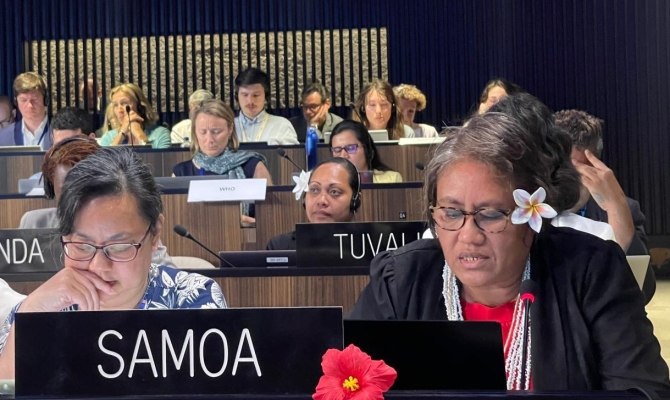The proposed legally binding instrument on plastic pollution, including in the marine environment, discussed at the second session of the Intergovernmental Negotiating Committee (INC-2) working to develop it, must contain a strong global obligation to incentivise the collection, sorting, recycling and safe disposal of plastic waste.
This is one the specific asks Samoa, on behalf of the Alliance of Small Island States (AOSIS), has placed on the negotiating table in Paris France, where negotiators and delegates from more than 190 countries, are advancing the formulation of a treaty they hope to finalise by 2024.
They met from Monday 29 May until Friday 02 June 2023. The substantive discussions on the elements of the proposed instrument, contained in what is commonly referred to as the options paper, took place on Wednesday, Thursday and Friday.
Since 1990, AOSIS has represented the interests of 39 small island and low-lying coastal developing states in international climate change, sustainable development, and ocean management negotiations and processes. As a voice for the vulnerable, its mandate is more than amplifying marginalised voices as it also advocates for these countries’ interests.
At INC-2, AOSIS has been vocal calling for an ambitious and comprehensive instrument that reflects the interests of Small Island Developing States (SIDS).
On the issue of Waste Management, including recycling in the options paper, the AOSIS intervention was delivered by Fiasosoitamalii Ugapo-Siaosi, Principal Chemical & Hazardous Waste Management Officer of Samoa’s Ministry of Natural Resources and Environment (MNRE).
“Given our small sizes and populations, there are concerns about resource-efficiency, commercial viability and the economies of scale as it relates to waste management and recycling. As we have mentioned in Contact Group 2, this Instrument will need to enable needs assessments for SIDS to achieve these targets and subsequent provision of the Means of Implementation (MOI),” she told negotiators at the UNESCO Headquarters.
AOSIS also called for Science, Technology and Economic Panels to develop guidelines and standards for environmentally-sound waste management practices, including sound means of preventing the leakage of plastics into the environment, especially the marine environment.
Illegal dumping and the disposal of plastic waste is one of the biggest challenges in the battle against plastic pollution. The Alliance of Small Island States countries say the instrument being formulated must address this issue.
“There should also be a global obligation to eventually phase out waste management practices which pose significant risks to the environment and human health based on sound evidence,” Ugapo-Siaosi emphasised.
Studies have found that humanity produces over 430 million tonnes of plastic annually, two-thirds of which are short-lived products that soon become waste.
According to the United Nations Environment Programme (UNEP), one million plastic bottles are purchased every minute around the world, while up to five trillion plastic bags are used worldwide every year. Half of all plastic produced is designed to be used just once and then discarded.
SOURCE: SPREP/PACNEWS














